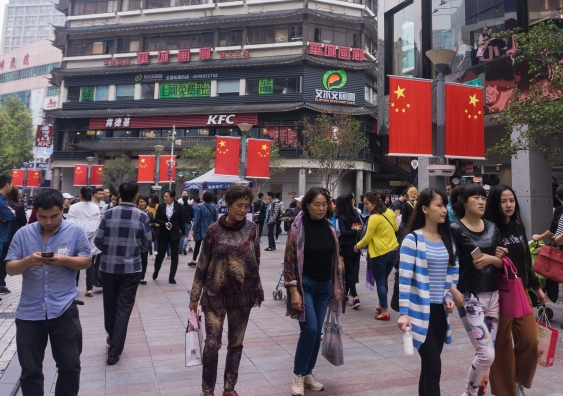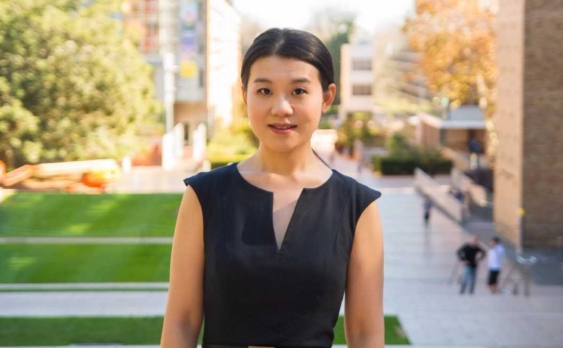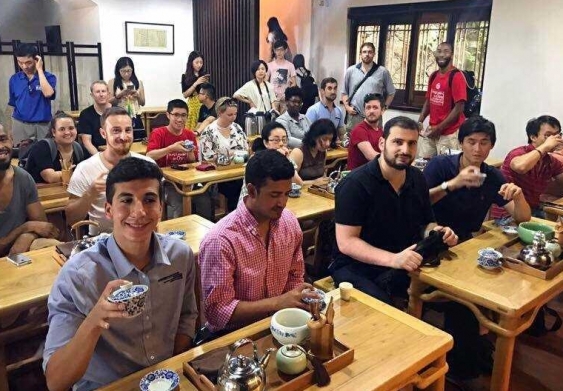New program to help student entrepreneurs tap China market
UNSW has launched a new program to give student entrepreneurs the edge when it comes to creating a business that will be successful in the Chinese marketplace.
UNSW has launched a new program to give student entrepreneurs the edge when it comes to creating a business that will be successful in the Chinese marketplace.

UNSW has launched a new program to give student entrepreneurs the edge when it comes to creating a business that will be successful in the Chinese marketplace.
‘Startup China’ is a full-time entrepreneurial support program focused on China, the first of its kind at an Australian university. It will provide tailored opportunities for UNSW students and alumni to learn about the world’s second largest market.
“My vision is for all UNSW entrepreneurs to become aware of the shifting global innovation landscape and the fast changing and often leading role that China is now playing,” says program manager Melissa Ran.
“As a market many times larger than ours, China represents a massive opportunity for Australian startups,” she says.

Startup China Program Manager Melissa Ran.
As an example, Ran says WeChat – China’s leading messaging app with 938 million monthly active users – processed more payments over Chinese New Year than PayPal did in all of 2015.
“For those founders in industries that are particularly 'China-relevant', I hope the program gives them the drive, skills, knowledge and networks to take advantage of the many exciting opportunities that the Chinese market represents,” she says.
Ran was born in Chengdu in Southwest China but grew up in Sydney and completed a Masters in Marketing and Commerce at UNSW. As a start-up founder herself, she understands the challenges beginning entrepreneurs face.
Ran is currently leading an 'Entrepreneurship and Innovation Tour' of Shanghai, Hangzhou and Beijing with nine UNSW startup entrepreneurs.
“Most of the nine startup founders have never been to China. They've all heard the hype about China's speed of innovation and this tour allows them to experience it firsthand,” says Ran.
“They are visiting successful tech firms such as Alibaba, Didi Chuxing and Tencent, as well as China's Silicon Valley – Zhongguancun.

UNSW entrepreneurs take part in a cultural activity as part of the Entrepreneurship and Innovation Tour of China.
Panel discussions with successful foreign entrepreneurs, lectures on Chinese consumer behaviour and the business environment, and cultural activities, including silk making and visiting the Great Wall, are also on the agenda.
UNSW Senior Startup Support Manager Joshua Flannery says demand for the program grew out of the popular ‘Start-up China’ competition, which has been running for three years.
“We could see there was demand from student and graduate entrepreneurs for a more comprehensive program and a dedicated China specialist.
“This, coupled with strong alignment with UNSW’s 2025 strategy and the plans for the Torch Innovation Precinct, strengthened the need for China startup support at the University,” says Flannery.
UNSW’s Torch Innovation Precinct will be a premier destination for entrepreneurship – showcasing Chinese and Australian collaboration and innovation in science and technology.
The Startup China program will feature international tours, community events, skill-based workshops and 1-1 consulting sessions, with a large-scale flagship event also in the planning stages.
Current UNSW students or alumni can get involved by contacting the startup program team about their China specific enquiries, as well as joining the Startup China mailing list.
The Startup China program is an addition to current UNSW entrepreneurial support for students, which includes free skills-building programs, business and legal advice and FounderLab.
FounderLab assists students and graduates who have great entrepreneurial ideas but lack the technical expertise to create a working prototype of their product.
“Since 2012, when these initiatives commenced in earnest, more than 400 startups have been supported in some way,” says Flannery.
One startup that has already benefitted from UNSW’s entrepreneurial support is Bangtuike, an AI-based content distribution platform that helps brands advertise to Chinese consumers via WeChat.
Bangtuike has more than 400,000 registered social media influencers. They have been able to reach an estimated 160 million targeted Chinese consumers and have developed an algorithm to better connect publishers’ content with the most interested audiences.
Bangtuike founder Hanson Li is a UNSW Computer Science and Engineering graduate. Li met one of his current investors, Follow[the]Seed, a global fund with deep connections in China, via UNSW’s start-up services.
“The Boston Consulting Group estimates there will be 100 million Chinese upper-middle class households with strong appetite for high quality products and services by 2020 and the Australian brands we’ve worked with, especially those in health and lifestyle industries, see our platform as one effective way of reaching them” says Li.
Alongside Li, other examples of UNSW alumni entrepreneurs engaging with China include Business School graduate Will Fan from QLC.io and Christina Chun from 1Scope.
Fan is currently participating in Chinaccelerator, China’s leading internet startup accelerator program and Chun recently announced $1 million in equity funding from a Chinese-backed property development company.
UNSW has produced more millionaire graduates than any other Australian university, according to consulting company WealthInsight and Spear’s magazine, and Ran hopes startups like Bangtuike, QLC.io and 1Scope will lead the charge in a movement that will produce many more.
To find out more about Startup China and other UNSW entrepreneurial programs, come along and have your questions answered at UNSW Open Day on Saturday, 2 September. Register your interest and plan your day at openday.unsw.edu.au.